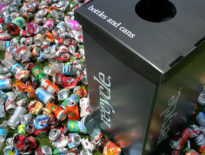Recycling in California is getting tougher. The state’s recycling rate, once the highest in the nation, has fallen below 50%. Problems within the bottle return system [1] and Chinese import restrictions have to be addressed if the state is to reach its 75% recycling goal.
Having been trained in recycling by California’s pioneer recyclers in the mid-1970s, I have every confidence that government agencies, private firms, and grassroots recycling organizations will resolve these problems soon.
Even More Problems Ahead
Big Soda has gotten the California Legislature to pass and the Governor to sign Assembly Bill 1838, preempting rule making responsibility at the local level in favor of the beverage industry. The law preempts local governments from levying fees and taxes on soda and other groceries. As has been widely reported, Coke, Pepsi, and other members of the American Beverage Association signed this backroom deal with California legislators in exchange for withdrawing a ballot measure that would make all local taxes require a ⅔ vote. In other words – political blackmail.
In addition to prohibiting so called “Soda Taxes,” the legislation would also prohibit any charges on grocery packaging, despite the fact that local fees and deposit systems have proven to be a successful tool in reducing waste, and have been used effectively by local jurisdictions for the past three decades.
This radical law is the result of Big Soda’s failure to win approval in California for their Extended Producer Responsibility scheme to take control over all recycling from local government and existing recycling enterprises. Their efforts also failed in Minnesota, Rhode Island, and Connecticut. [2]
Grassroots recycling leaders lambasted the content of the law and the behind-the-scene maneuvers that allowed it to happen.
“Threatening funding for local police, firefighters, parks, roads, and public transit to force the legislature to prohibit residents from having a say on soda taxes or fees on packaging is not only an underhanded move by Big Soda, but it is also a perversion of our initiative process. The public has been clear that they want manufacturers to bare the cost of their impacts on our personal health and the health of our planet, and we urge local governments to stand up to this corporate bullying and use all the tools in their toolbox to achieve these goals.”
– Nick Lapis, Director of Advocacy for Californians Against Waste
“This bill will obstruct local efforts of groups working hard to deal with the plastic pollution crisis. This is just one more attempt by big industry to silence community activism – but the tide is turning on plastic pollution, and this is one issue that we fully expect to win.”
– Anna Wagner, Los Angeles-based Senior National Organizer, Greenpeace.
“This bill is an egregious example of big soda exerting undue financial influence to try and prevent municipalities from protecting the health and well-being of our communities. As a movement, we plan to support local governments to oppose this going forward –as we believe strongly in a democratic process that puts people and planet over profits.”
– Anna Cummins, Global Strategy Director for 5 Gyres
“This beverage industry today has silenced the voice of local communities and pre-empted them from incorporating health and environmental costs into the cost of their products. This is shameless and sets a bad precedent. Local communities should not be held hostage to industry giants, like Coke and Pepsi, in addressing costs to public health and the environment from products like sugary beverages or plastic packaging.”
– Miriam Gordon, Policy Director, UPSTREAM
“Taking away the right of local communities to regulate top forms of litter is an affront to democratic principles and the authority of local government. The everyday citizen loses when corporations, special interests and state lawmakers interfere in local law-making to protect communities from litter, pollution and blight.”
– Angela T. Howe, Esq., Legal Director, Surfrider Foundation [3]
ILSR’s Waste to Wealth Initiative will report on how recyclers, citizens and legislators are fighting back against, what amounts to corporate blackmail.
[1] Hundreds of buy-back centers have been closed; massive cheating in the deposit system by out of state haulers has been exposed and discrimination against smaller and minority processors have been alleged.
[2] See https://ilsr.org/connecticut-legislators-say-no-to-turn-local-recycling-over-to-beverage-companies/ and https://ilsr.org/epr-good-bad-ugly/.
[3] For more details see Break Free From Plastic, a global network focused on massive reduction in single use plastic and for lasting solutions to the plastic pollution founded in 2016, www.breakfreefromplastic.org.





